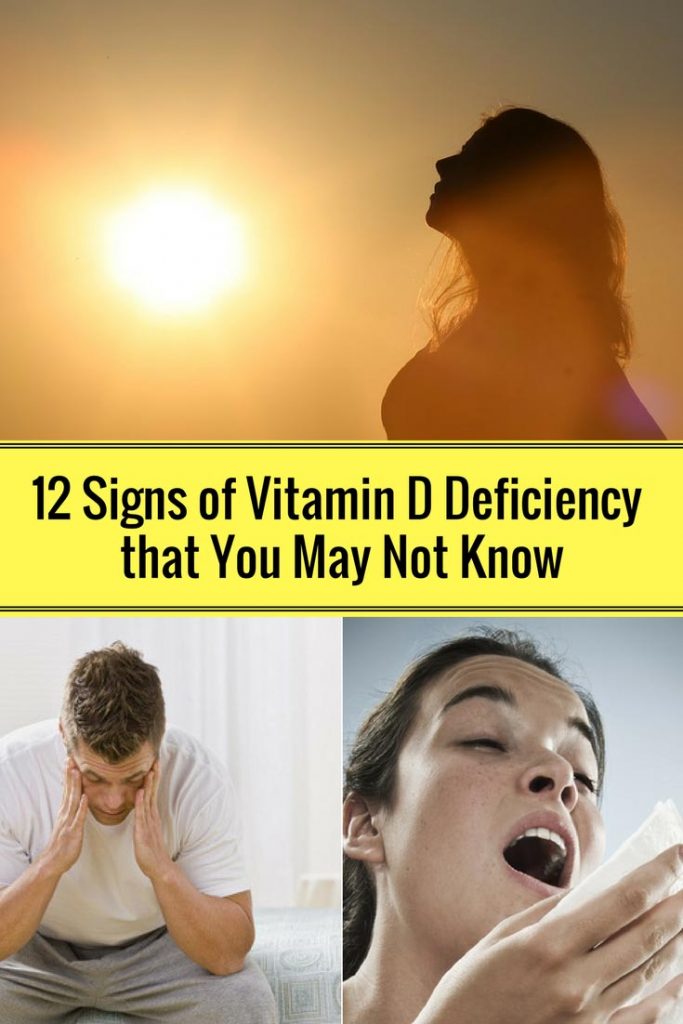12 Signs of Vitamin D Deficiency that You May Not Know

Vitamin D is not technically a vitamin. It is a steroid hormone intended to be absorbed primarily through sun exposure, not diet. There aren’t many foods that naturally contain therapeutic levels of vitamin D and even foods that are fortified with vitamin D, such as milk, do not contain it in high enough levels to support your health needs. The form of vitamin D found in foods is more difficult for your body to absorb.
Vitamin D is best absorbed via sunlight. In today’s post-industrial economy, most people work indoors. This has led to an increase in vitamin D deficiency; it is a very common ailment in the US and sadly underdiagnosed. The following is a compilation of symptoms that might indicate a vitamin D deficiency.
1) You feel sad/depressed
There is a reason that people tend to feel a little lackluster during those dark winter days. Serotonin is the brain hormone associated with mood elevation and it rises along with exposure to bright lights and falls when you experience a shortage of sunlight. Furthermore, according to a study in the British Journal of Psychiatry involving over 31,000 participants, people with low vitamin D levels in their blood were twice as likely to experience depression than those with higher levels. The hippocampus and other parts of your brain that help to regulate your mood contain vitamin D receptors. Researchers suggest that low levels of vitamin D may interfere with functionality in these areas of the brain.
2) Achy bones
Doctors have been known to mistakenly diagnose patients who come in with aches and pains as having chronic fatigue syndrome or fibromyalgia. A chronic ache in your bones is a classic symptom of vitamin D deficiency osteomalacia. The deficiency can reduce calcium in the collagen matrix in your skeleton, leading to throbbing pain and aching bones.
3) Head sweating
It might sound a little strange, but a sweaty head is a classic sign of vitamin D deficiency, and is usually one of the first symptoms to manifest. Pay particular attention to head sweating in newborns. Excessive sweating of the head in newborn babies might indicate neuromuscular irritability and is a common and early red flag for vitamin D deficiency.
4) You Have Gut Trouble
If you are experiencing trouble or discomfort in your gut, it could mean that you are vitamin D deficient. Vitamin D is fat-soluble. If you have a gastrointestinal condition, such as Crohn’s, inflammatory bowel disease, celiac disease or non-celiac gluten sensitivity, it will impair your ability to absorb fat, causing you to have lower absorption of important fat-soluble vitamins and nutrients such as vitamin D.
5) High Blood Pressure
There is a correlation between vitamin D deficiency and heart health. Though the role that vitamin D plays is not entirely clear and more research is needed, many in the medical community believe that vitamin D deficiency is linked to heart disease and an increased risk of hypertension (high blood pressure). Vitamin D helps to regulate blood pressure; insufficient amounts may lead to a rise in blood pressure.
6) Sleepiness
A vitamin D deficiency might make you feel less alert during the day. The Journal of Clinical Sleep Medicine published a study that found a correlation between lower levels of vitamin D and higher levels of daytime drowsiness.

7) Erectile Dysfunction
Erectile dysfunction(ED) is the most common sexual issue among men. It affects nearly 30 million men in the United States. Though it can stem from other health conditions such as prostate cancer, diabetes, and high blood pressure, it may also indicate a shortage of vitamin D. If you have severe erectile dysfunction, that could be a sign that you are vitamin D deficient. The Journal of Sexual Medicine published a study in 2014 that found that men with severe erectile dysfunction consistently had significantly lower levels of vitamin D than male patients with mild cases.
8) Psoriatic Arthritis
Sometimes the immune system can attack the joints, causing pain and inflammation. This condition is called psoriatic arthritis. Approximately 30% of people who have psoriasis also have psoriatic arthritis. The medical journal Arthritis Care & Research recently reported that Over 60% of patients with psoriatic arthritis have vitamin D deficiency. Doctors and medical researchers speculate that low levels of vitamin D might increase inflammation in conditions such as psoriatic arthritis by increasing levels of white blood cells in the body.
9) Periodontal Disease
Periodontal disease is a chronic gum disease marked by swelling and bleeding of the gums. Vitamin D helps the body produce defensins and cathelicidin which are compounds containing microbial properties that lower bacteria in the mouth.
10) It May Speed Up Multiple Sclerosis
Research has shown a link between low levels of vitamin D and a heightened risk of neuromuscular disorders such as Parkinson’s and multiple sclerosis. Furthermore, new research indicates that for those who have been diagnosed with multiple sclerosis, low vitamin D levels could exacerbate the condition, speeding the progression and severity of the disease.
11) Chronic Pain
If you have acute vitamin D deficiency, you might experience chronic pain or pain in your bones. The symptom is relatively subtle but don’t take it lightly. Get your levels checked as soon as possible. A health clinic in Minneapolis conducted a study in which 150 people came to the clinic complaining of chronic pain. When vitamin D levels were tested, 93% suffered from significantly low vitamin D. The demographic most likely to suffer from low levels of vitamin D are white women of childbearing age.
12) Dementia
Dementia involves an insidious decline in memory, thinking, and behavior that affects every sphere of daily life. In 2014, the journal Neurology published an article claiming that acute vitamin D deficiency in older adults might double the risk of certain forms of dementia, including Alzheimer’s disease. Nearly 80% of dementia cases manifest as Alzheimer’s disease; it is easily the most common form of dementia, according to the Alzheimer’s Association.
If you don’t spend enough time in the sun or if your body has trouble absorbing the vitamin, you may not get enough. Here are 12 ways to ensure adequate intake.
 Home and Gardening Ideas At home and Gardening ideas we believe inspiring readers about homesteading, self sufficiency
Home and Gardening Ideas At home and Gardening ideas we believe inspiring readers about homesteading, self sufficiency






